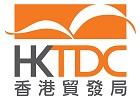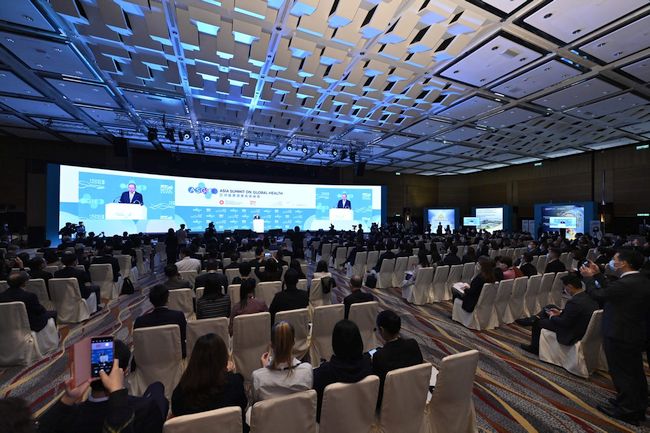
 |
|
|
Carrie Lam, Chief Executive of the HKSAR, Dr Peter K N Lam, Chairman of the HKTDC, and Dr Soumya Swaminathan, Chief Scientist, World Health Organization (WHO), spoke at the summit's opening ceremony. In his welcome remarks, Dr Lam said: "Since early 2020, the world has been fighting not only one of the biggest health crises in decades, but also economic and social challenges resulting from the pandemic. Thankfully, we have seen the power of innovation and collaboration, as the world came together to develop vaccines at an unprecedented speed. As Asia emerges as an increasingly important player in the global health landscape, Hong Kong, with its three key advantages, namely its status as an international financial hub, the world's best universities devoted to research and development, and its importance in the Guangdong-Hong Kong-Macao Greater Bay Area (GBA), has also been recognised as the ideal platform for research and business development in the global healthcare industry. It is against this exciting backdrop that the Asia Summit on Global Health was conceived, with the aim to provide a one-stop international platform for exchange and collaboration between the healthcare, investment, business and technology sectors."
Addressing ASGH participants at the opening session, Dr Swaminathan said: "We have many things that we can learn from this pandemic, and the lessons should be applied not only to preventing future pandemics, but also to making sure that our health systems are strengthened, and I think that is what this particular conference is going to address. There are some very key learnings. The first is that health systems need to be agile and resilient. They need to have an adequate and well-trained health workforce. The second big lesson has been that communities are important and that in many countries that have focused on strengthening primary healthcare systems, in places where the health workers and the community have a good trusting relationship, that's where actually the response to the pandemic has worked well. Obviously, medicines, medical products and technologies, and digital tools have played a big role. Going forward, we need to see how a holistic plan for the country is developed and how best these digital technologies can help to supplement and complement the services that are being delivered in order to accelerate the sustainable development goal targets."
Shaping a resilient healthcare system in the new normal
The COVID-19 pandemic has exacerbated existing public healthcare challenges and collaboration across the health ecosystem has once again come under scrutiny. The Policy Dialogue session chaired by Dr Margaret Chan, Founding Dean, Vanke School of Public Health, Tsinghua University, and Emeritus Director-General, WHO, examined the impact of current global public health issues on future policies and looked at ways to build a more resistant, fairer and more effective long-term public health system. Speakers included Nachman Ash, Director-General and Ministry of Health, Israel; Sophia Chan, Secretary for Food and Health of the HKSAR; Dr Takeshi Kasai, Regional Director for the Western Pacific, WHO; Ma Xiaowei, Minister for National Health Commission of the People's Republic of China; and Ong Ye Kung, Minister for Health, Republic of Singapore.
At a panel discussion under the summit's theme "Shaping a Resilient and Sustainable Future", the panellists shared their views on the development of the healthcare industry in the post-pandemic world and the opportunities it will bring. Chaired by Victor Chu, Chairman & CEO, First Eastern Investment Group, the panel speakers included Chen Qiyu, Executive Director and Co-CEO, Fosun International Limited; Fred Hu, Chairman, Primavera Capital Group; Dr Dennis Lo, Director and Li Ka Shing Professor of Medicine and Professor of Chemical Pathology, The Chinese University of Hong Kong; and Leon Wang, Executive Vice President, International and China President, AstraZeneca.
Great potential in Asia's healthcare industry
The 14th Five-Year Plan emphasises the strategy of dual circulation, which has significant implications for the global investment and healthcare markets. At a panel discussion titled "Healthcare in China: Deciphering the Dual Circulation Opportunities" and chaired by Antony Leung, Group Chairman & CEO, Nan Fung Group and Group Chairman & Co-Founder, New Frontier Group, panellists including Nicolas Aguzin, Executive Director, Chief Executive Officer, Hong Kong Exchanges and Clearing Limited; Cheng Cheung Ling, Vice Chairlady, Sino Biopharmaceutical Limited; Claudia Suessmuth Dyckerhoff, Board Member of Hoffmann-La Roche; Nisa Leung, Managing Partner, Qiming Venture Partners; Jieyuan Liao, Founder, Chairman and Chief Executive Officer, We Doctor Holdings Limited; and Rocky Tuan, Vice-Chancellor and President, The Chinese University of Hong Kong, shed light on the dual circulation strategy's impact on the healthcare industry.
Hong Kong's innovative technology sector is entering a golden age and has extended huge effort in developing new health-related technologies and solutions. Complemented by the strengths of other GBA cities, this places Hong Kong in an ideal position to help create a healthcare hub in the Bay Area. The panel discussion "Hong Kong as a Gateway to Greater Bay Area Opportunities" explored ways to strengthen Hong Kong's role as a springboard for healthcare industries at home and abroad, and to introduce the city's medical innovations to the world. Alfred Sit, Secretary for Innovation and Technology of the HKSAR, delivered special remarks at the session while Lee George Lam, Chairman, Hong Kong Cyberport Management Company Limited, gave a welcome speech. The panel for this discussion was chaired by Dr Donald Li, President, World Organization of Family Doctors (WONCA). Speakers included Dennis Lam, Chairman & CEO, C-MER Eye Care Holdings Limited; Chung-Mau Lo, Hospital Chief Executive, The University of Hong Kong-Shenzhen Hospital; Leslie Lu, Executive Director and Co-CEO, EC Healthcare; Tony Mok, Li Shu Fan Medical Foundation Professor of Clinical Oncology and Chairman of Department of Clinical Oncology, The Chinese University of Hong Kong; Anita Ou, Head of Corporate (Services), Commercial Banking, The Hongkong and Shanghai Banking Corporation Limited (Hong Kong); and Dr Kenneth Tsang, Chief Executive Officer, Gleneagles Hospital Hong Kong.
Hong Kong has become Asia-Pacific's largest IPO centre for biotech companies and the second largest in the world. At two panel discussions, titled "Hong Kong: Funding and Commercialisation Platform for the Global Healthcare Industry" and "What's Next for Healthcare Innovation and Investment", regulatory agencies, investors, insurance professionals and biotechnology innovators examined how Hong Kong could facilitate development and financing for healthcare companies across the world, and discussed the city's advantages as a base for strategic biomedical research in the region.
Meanwhile, the ageing population in Asia has increased the demand for medical and health services. Focusing on the market within the Association of Southeast Asian Nations (ASEAN), the panel discussion "Evolving Healthcare Delivery in ASEAN", featuring major investors and healthcare industry representatives from the ASEAN bloc, delved into the radical changes seen in the region's healthcare value chain, as well as opportunities for collaboration among ASEAN countries.
Exploring hot topics in healthcare technology and inspiring the future
The pandemic has brought technology to the frontline of healthcare. The "Inspirational Track" session in the afternoon comprised a number of thematic forums on forward-looking issues, including "Digital Health and the New Growth in Healthcare", "How AI and Data Revolutionise the Future of Pharmaceuticals" and "Medtech Reimagined from Diagnosis to Cure". Panellists including international leaders and innovators in medical technology discussed the latest trends, developments, challenges and investment opportunities in the transformation of medical and health services brought by technological innovation in the post-COVID "new health economy".
The outbreak of COVID-19 has highlighted problems in the public healthcare system and the need for seamless cross-border collaboration in healthcare. The afternoon's "Sustainability Track" session saw representatives and scholars from around the world explore topics such as "COVID-19: New Perspective in Global Public Health", "In Conversation: Prevention is Better than Cure - Nutrition, Lifestyle Interventions and Healthy Ageing", "Health Equity and Sustainable Development" and "Resilient Public Health System for the Future", highlighting how global collaboration will play a key role in achieving equity in healthcare access across the world.
Matchmaking and exchange for global healthcare investors
The ASGH Deal Flow Matchmaking service connected investors with owners of projects in the healthcare and medical sectors based on their shared areas of interest. By setting up one-to-one physical and online meetings between project owners and investors from venture capital, private equity, family offices and institutions, the summit provided a platform for global business exchange and collaboration.
The InnoHealth Showcase and Exhibition showcased the latest technologies from about 100 start-ups, medical and health companies and institutions. Medical and healthcare investment project presentations and various activities took place both onsite and online, covering industries such as biotechnology, pharmaceuticals and medical equipment. Biotechnology and healthcare start-ups had the opportunity to meet with investors and industry experts in the Business of Healthcare Advisory Zone, either onsite or through the summit's digital platform, to exchange ideas, seek advice and formulate business strategies. The zone provided a full range of consultation services, including fundraising, R&D collaboration, intellectual property licensing arrangement, market access and distribution models, and incubation services.
Websites
- Event website: https://www.asiasummitglobalhealth.com
- Programme: https://www.asiasummitglobalhealth.com/en/programme/programme
- Speakers: https://www.asiasummitglobalhealth.com/en/speaker/speakers
- Photo download: https://bit.ly/3oZhnCH
Media enquiries:
HKTDC's Communication and Public Affairs Department
Sunny Ng, Tel: +852 2584 4357, Email: sunny.sl.ng@hktdc.org
Sam Ho, Tel: +852 2584 4569, Email: sam.sy.ho@hktdc.org
Yuan Tung Financial Relations:
Agnes Yiu, Tel: +852 3428 5690, Email: ayiu@yuantung.com.hk
Hing-fung Wong, Tel: +852 3428 3122, Email: hfwong@yuantung.com.hk
About HKTDC
The Hong Kong Trade Development Council (HKTDC) is a statutory body established in 1966 to promote, assist and develop Hong Kong's trade. With 50 offices globally, including 13 in Mainland China, the HKTDC promotes Hong Kong as a two-way global investment and business hub. The HKTDC organises international exhibitions, conferences and business missions to create business opportunities for companies, particularly small and medium-sized enterprises (SMEs), in the mainland and international markets. The HKTDC also provides up-to-date market insights and product information via research reports and digital news channels. For more information, please visit: www.hktdc.com/aboutus. Follow us on Twitter @hktdc and LinkedIn
Copyright 2021 ACN Newswire. All rights reserved. www.acnnewswire.com
source https://www.acnnewswire.com/press-release/english/71281/